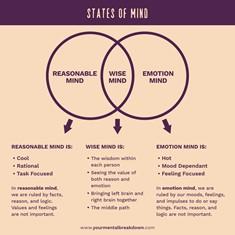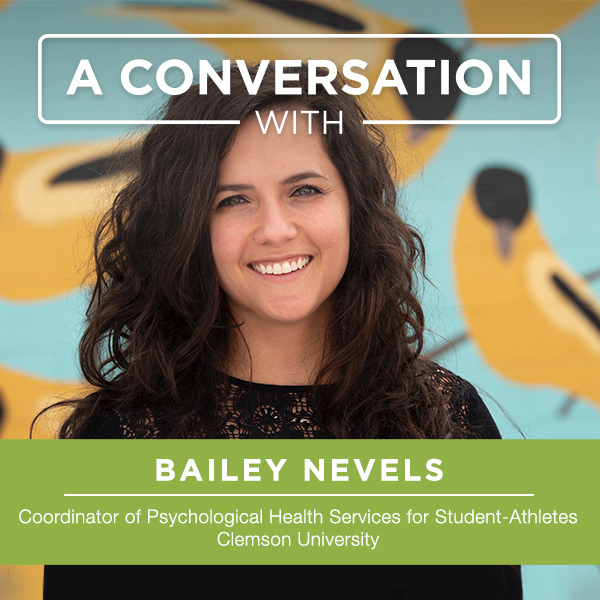Welcome back to another installment of our “Conversations” series. This time, we had the pleasure of talking with Dr. Bailey Nevels, licensed psychologist, Coordinator of Psychological Health Services for Student-Athletes at Clemson University, and wife of our very own Alex Nevels!
Bailey joined us for a Noonovate all around mental health. She talked through the feeling of languishing, defined by Adam Grant as “a sense of stagnation and emptiness,” that many people are experiencing after going through the COVID-19 pandemic. The good news? Bailey gave us practical skills to help us get to the opposite of languishing: flourishing! Here’s what she shared.
WISE MIND
The Wise Mind concept suggests that each of us have a Reasonable Mind and an Emotional Mind—the middle ground between these two is the Wise Mind, which takes into account both paths of thinking. Our Wise Mind uses the best of both our reasonable and emotional selves, acknowledging both sides of ourselves without saying that one is better than the other. When facing a situation, before reacting immediately from either our reasonable or emotional mind, we should ask ourselves, “what would wise mind do?” to consider what we both feel and know before acting.
RADICAL ACCEPTANCE
Radical acceptance is the idea of accepting reality as it is without dwelling on how you wish things were different. For example, instead of looking outside, seeing that it’s raining, and thinking, “I hate rain. I wish it weren’t raining. My day is going to be so much worse now that it’s raining,” radical acceptance suggests that we look outside, see that it’s raining, and think, “Yep, it’s raining.” Radical acceptance can feel…well, radical, and takes some practice to get used to. When things don’t go how we’d like them to go, it’s natural to want to ruminate on the situation and think about how you wish things were different. However, wishing to change a situation that cannot be changed will only result in suffering and frustration. Bailey recommended that we practice labeling our thoughts or feelings. Naming our feelings creates some distance between ourselves and what we feel so we can take a step back and evaluate the situation from a distance.
OPPOSITE ACTION
The final practice Bailey shared with us is called opposite action. As humans, we experience 10 primary emotions: fear, anger, sadness, disgust, guilt, shame, joy, love, jealousy, and envy. Each of these emotions prompts us to behave a certain way. Opposite action suggests we should first identify and name the emotion we are experiencing and then evaluate whether that emotion “fits the facts of the situation.” Sometimes acting on what we’re feeling is appropriate, for example, feeling fear in a truly dangerous situation. Other times our emotional urges do not fit the facts of the situation, and we should in fact take the opposite action. An example of this is feeling sadness and wanting to withdraw and isolate yourself. The opposite action of this, getting out and connecting with others, could actually be more helpful than what your initial feeling tells you to do.
We loved hearing from Bailey and gaining some practical tips for improving our daily mental state. We all believe that getting help for your mental health is nothing to be ashamed of, and in fact, is encouraged. Bailey shared this resource from The Skimm that can help you see if therapy is right for you.



